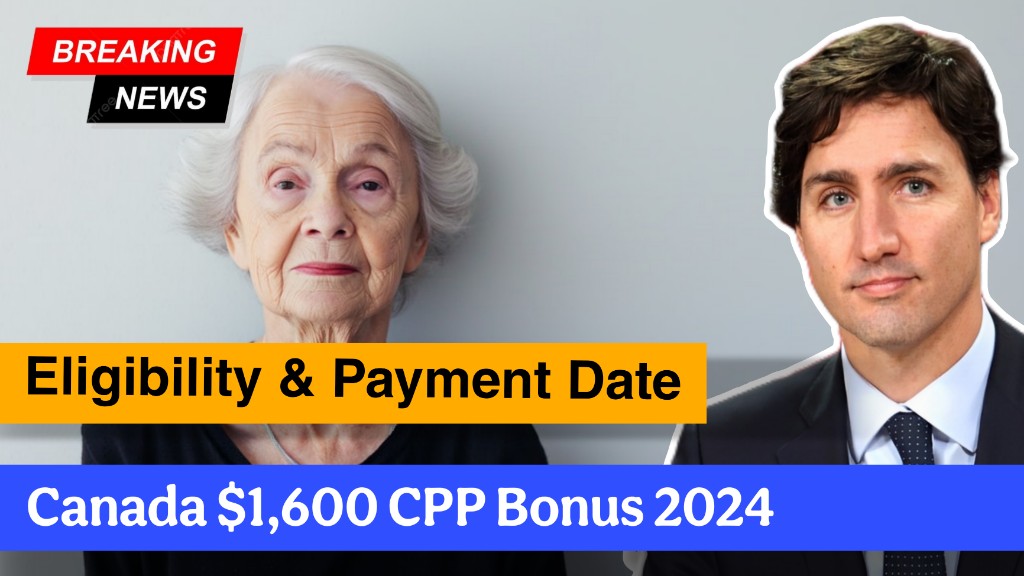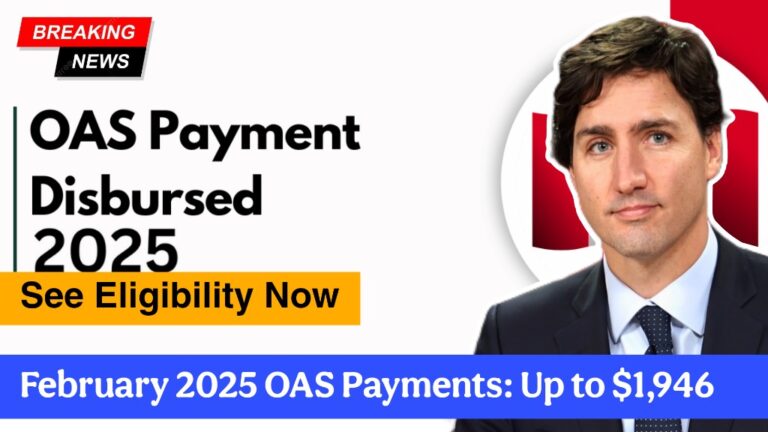Canada $1,600 CPP Bonus 2024 – In response to rising living costs and economic pressures, the Canadian government is considering a one-time $1,600 CPP Bonus Payment for eligible retirees in 2024. Though not yet officially confirmed, this initiative aims to provide financial relief to seniors who rely on the Canada Pension Plan (CPP) as a key source of retirement income. If approved, the bonus payment would offer much-needed support to lower-income seniors struggling with inflation-driven expenses, such as housing, healthcare, and groceries.
To qualify, individuals must meet specific criteria, including age and contribution history. This article explores the details of the proposed payment, eligibility requirements, tax implications, and strategies to maximize your CPP benefits.
Table of Contents
- 1 Key Information About the Proposed $1,600 CPP Bonus Payment
- 2 What Is the Proposed $1,600 CPP Bonus Payment?
- 3 Who Qualifies for the Proposed Bonus Payment?
- 4 How Would the Bonus Be Distributed?
- 5 Tax Implications of the Bonus Payment
- 6 Strategies to Maximize Your CPP Benefits
- 7 Real-Life Example: How the Bonus Could Help
- 8 What Should You Do If the Bonus Is Approved?
- 9 Conclusion
Key Information About the Proposed $1,600 CPP Bonus Payment
| TOPIC | DETAILS |
|---|---|
| Payment Amount | $1,600 (one-time, taxable) |
| Eligibility Criteria | At least 60 years old; contributed to CPP |
| Purpose | Provide financial relief amid rising living costs |
| Distribution Timing | Aligned with regular CPP payments (if approved) |
| Tax Implications | Taxable income; report on 2024 tax return |
| Official Resource | Service Canada |
This potential bonus underscores the government’s commitment to supporting retirees during challenging economic times.
Also Read: $750 + $890 Double CPP Payment in Dec 2024 – Latest Update
What Is the Proposed $1,600 CPP Bonus Payment?
The $1,600 CPP Bonus Payment is a one-time initiative designed to assist retirees facing financial strain due to rising inflation and increased living costs. While traditional CPP payments are calculated based on contributions made during working years, this bonus would be a flat amount distributed to eligible recipients. It is particularly targeted at lower-income seniors , who often rely heavily on government benefits to make ends meet.
Purpose of the Bonus Payment
The primary objectives of the proposed bonus include:
- Offsetting Rising Costs: Help seniors manage essential expenses like groceries, utilities, and healthcare.
- Addressing Inflation: Provide a buffer against the impact of inflation on fixed incomes.
- Supporting Vulnerable Populations: Ensure that lower-income retirees receive additional financial assistance during challenging times.
For example, a senior receiving a modest monthly CPP benefit could use the $1,600 to cover unexpected medical expenses or home repairs, easing their financial burden significantly.
Who Qualifies for the Proposed Bonus Payment?
To qualify for the $1,600 CPP Bonus Payment , individuals must meet the following criteria:
- Age Requirement:
- Must be at least 60 years old by December 31, 2024.
- CPP Contribution History:
- Must have contributed to the Canada Pension Plan during their working years. Contributions determine eligibility for regular CPP benefits and, by extension, any associated bonuses.
- Current CPP Recipient Status:
- Individuals already receiving CPP retirement, disability, or survivor benefits are likely to qualify automatically.
- Residency Status:
- Must be a Canadian resident and citizen or a legal resident who has lived in Canada for at least 10 years after turning 18.
While the exact eligibility details may vary, these criteria align with existing CPP enrollment requirements.
How Would the Bonus Be Distributed?
If approved, the $1,600 CPP Bonus Payment would be distributed in alignment with regular CPP payments, which are typically issued monthly. Here’s how it might work:
- Direct Deposit:
- For seniors enrolled in direct deposit, the bonus would be automatically credited to their bank accounts alongside their regular CPP payment.
- Mailed Checks:
- For those receiving CPP payments via mail, the bonus would be issued as a separate cheque. However, mailed checks may result in slower delivery times compared to direct deposit.
To ensure timely receipt, seniors are encouraged to enroll in direct deposit if they haven’t already done so. Updates can be made through My Service Canada Account or by contacting Service Canada directly.
Tax Implications of the Bonus Payment
The $1,600 CPP Bonus Payment would be considered taxable income and must be reported on your 2024 tax return . While this means recipients may owe taxes on the bonus, the overall impact depends on their total income and tax bracket. For example:
- A senior with a modest income may face minimal tax liability.
- Those with higher incomes may see a greater portion of the bonus taxed.
Seniors should consult a financial advisor or tax professional to understand how the bonus will affect their overall tax situation and plan accordingly.
Strategies to Maximize Your CPP Benefits
Even as Canadians await confirmation of the $1,600 CPP Bonus Payment , there are several ways to optimize your CPP benefits and enhance your retirement income:
- Delay CPP Collection:
- Delaying CPP payments beyond the standard retirement age of 65 can increase your monthly benefit by up to 42% by age 70. This strategy maximizes long-term payouts, especially for those with longer life expectancies.
- Combine with OAS and GIS:
- Pairing CPP benefits with Old Age Security (OAS) and the Guaranteed Income Supplement (GIS) can significantly boost retirement income. Lower-income seniors may qualify for GIS, which provides additional financial support.
- Monitor Updates from Service Canada:
- Stay informed about changes to CPP and other retirement programs by regularly visiting the Service Canada website or subscribing to email alerts.
- Plan for Taxes:
- Factor in the taxable nature of CPP benefits when budgeting. Setting aside a portion of your payments for taxes can prevent surprises during tax season.
Real-Life Example: How the Bonus Could Help
Consider Margaret, a 67-year-old retiree living in Ontario. With a modest monthly CPP benefit of $750 , she struggles to cover rising utility bills and prescription medication costs. If the $1,600 bonus is approved, Margaret could use it to:
- Pay off outstanding debts.
- Stock up on essentials like groceries and winter supplies.
- Contribute to her granddaughter’s education fund.
Similarly, John, a 72-year-old retiree in Alberta, relies on CPP, OAS, and GIS to make ends meet. The bonus would allow him to address home maintenance needs, such as installing energy-efficient windows, reducing future heating costs.
Also Read: $3,200 Payment for Canadian Seniors in 2024 – Are You Eligible?
What Should You Do If the Bonus Is Approved?
If the $1,600 CPP Bonus Payment is confirmed, here’s what you can do to ensure you receive it promptly:
- Update Your Information:
- Verify that your banking details (for direct deposit) or mailing address (for cheques) are accurate in your Service Canada account .
- Monitor Updates:
- Regularly check the Service Canada website or subscribe to newsletters for announcements regarding the bonus payment.
- Plan for Taxes:
- Consult a financial advisor to understand how the bonus will impact your tax liability and adjust your budget accordingly.
- Combine with Other Programs:
- Explore whether you qualify for additional benefits like GIS or provincial supplements to further enhance your retirement income.
Conclusion
The proposed $1,600 CPP Bonus Payment for 2024 represents a meaningful effort to support Canadian retirees facing rising living costs. By targeting eligible CPP recipients—particularly lower-income seniors—the government aims to ease financial pressures and improve quality of life during retirement. While the bonus is still under consideration, understanding its potential impact, eligibility criteria, and tax implications can help seniors prepare for its arrival.
For updates and assistance, visit the official Service Canada website or contact their helpline. With proactive planning and strategic decisions, retirees can optimize their CPP benefits and achieve greater financial stability in retirement.




